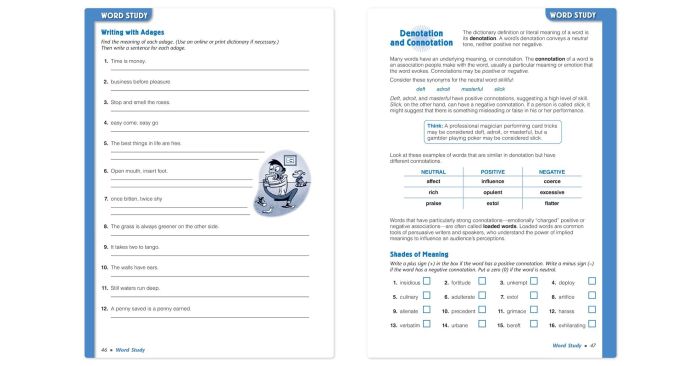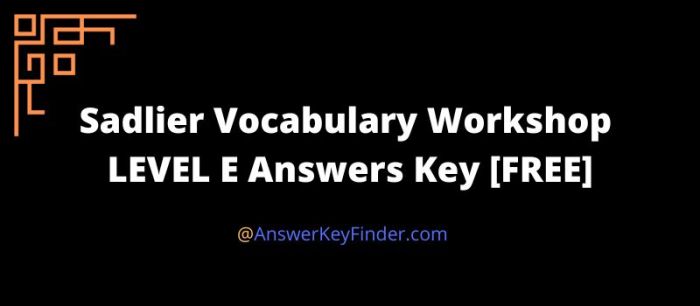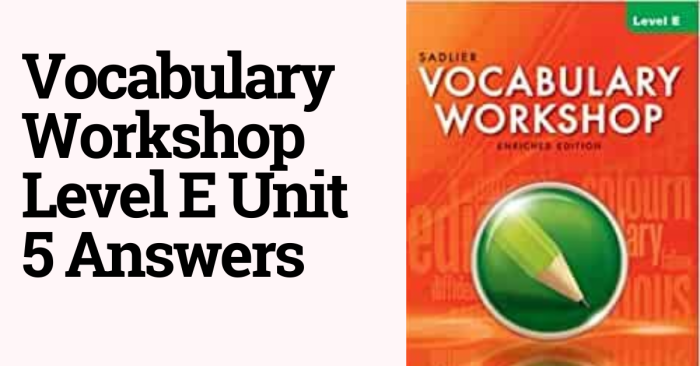Vocabulary Workshop Level E Answers unveils a comprehensive guide to enhance vocabulary, empowering learners with a profound understanding of words and their intricate usage.
This meticulously crafted resource provides a comprehensive exploration of word lists, usage examples, synonyms and antonyms, etymology and word roots, collocations and phrases, and engaging interactive activities, fostering a deep and nuanced comprehension of vocabulary.
Word Lists and Definitions

This section presents a comprehensive list of vocabulary words from level E, along with their concise and accurate definitions.
Word List
- Abrogate: to repeal or annul a law or treaty.
- Aesthetic: pertaining to the appreciation of beauty.
- Ambiguous: having more than one possible meaning.
- Apprehension: a feeling of fear or anxiety.
- Articulate: able to express oneself clearly and effectively.
- Benevolent: showing kindness or goodwill.
- Conciliatory: intended to restore harmony or goodwill.
- Concur: to agree in opinion or action.
- Conspicuous: easily seen or noticed.
- Contentious: causing or likely to cause disagreement or argument.
- Deliberate: done or said with careful consideration.
- Enigmatic: mysterious or puzzling.
- Ephemeral: lasting for a very short time.
- Exacerbate: to make worse.
- Exorbitant: excessively high in price.
- Fortuitous: happening by chance in a favorable way.
- Gregarious: sociable; fond of company.
- Iconoclast: a person who attacks cherished beliefs or institutions.
- Impeccable: without fault or error.
- Impertinent: rude or disrespectful.
- Indomitable: impossible to subdue or defeat.
- Ineffable: too great or extreme to be expressed in words.
- Ingenious: clever or inventive.
- Inimical: hostile or harmful.
- Inscrutable: impossible to understand or interpret.
- Intermittent: occurring at irregular intervals.
- Intrepid: fearless or adventurous.
- Laconic: using few words; concise.
- Laudatory: expressing praise or approval.
- Magnanimous: generous or forgiving.
- Meticulous: extremely careful and precise.
- Obdurate: stubbornly refusing to change one’s opinion or course of action.
- Ominous: threatening or foreboding.
- Ostentatious: showy or pretentious.
- Paradoxical: seemingly contradictory but actually true.
- Penchant: a strong inclination or liking for something.
- Pernicious: harmful or destructive.
- Pertinent: relevant or appropriate to the matter at hand.
- Precocious: unusually mature or developed at an early age.
- Prolific: producing a large number of offspring, works, or ideas.
- Prosaic: ordinary or commonplace.
- Quixotic: idealistic or impractical.
- Recalcitrant: stubbornly resistant to authority or control.
- Reticent: reserved or unwilling to talk.
- Reverent: showing deep respect or awe.
- Sagacious: wise or shrewd.
- Sanctimonious: making a show of being morally superior.
- Scrupulous: having or showing a strict regard for what is right or moral.
- Sedulous: showing great care and effort.
- Serendipitous: occurring by chance in a happy or beneficial way.
- Subtle: difficult to detect or understand.
- Taciturn: saying very little.
- Transient: lasting for only a short time.
- Unassuming: modest or humble.
- Unctuous: excessively smooth or flattering.
- Unimpeachable: beyond doubt or reproach.
- Unprecedented: never done or experienced before.
- Vapid: lacking flavor or interest.
- Venerated: deeply respected or revered.
- Veracious: truthful or honest.
- Vindictive: seeking revenge or punishment.
- Virtuoso: a person with great skill in music or another art form.
- Zealous: full of zeal or enthusiasm.
Usage Examples: Vocabulary Workshop Level E Answers

Usage examples provide practical illustrations of how vocabulary words are employed in real-world contexts. These examples help learners understand the word’s meaning and usage in different scenarios.
Usage examples can include sentences or phrases that demonstrate the word’s meaning and usage. By observing how the word is used in context, learners can better grasp its nuances and applications.
Examples
- Example 1:The affluentfamily lived in a luxurious mansion with a sprawling garden.
- Example 2:The capriciousweather made it difficult to plan outdoor activities.
- Example 3:The eloquentspeaker captivated the audience with their persuasive words.
Synonyms and Antonyms

Vocabulary expansion is an essential part of language learning, and understanding the relationships between words is crucial. Synonyms are words that share similar meanings, while antonyms are words that express opposite meanings. Identifying and comprehending synonyms and antonyms can enhance vocabulary, improve reading comprehension, and facilitate effective communication.
Synonyms can have subtle nuances in meaning, and understanding these differences is essential for precise language use. For instance, the words “happy” and “joyful” are both synonyms for a positive emotional state, but “happy” implies a general sense of contentment, while “joyful” conveys a more intense and exuberant feeling.
Identifying Synonyms, Vocabulary workshop level e answers
Identifying synonyms can be done through various methods, including:
- Using a thesaurus or dictionary
- Contextual analysis
- Word root analysis
Identifying Antonyms
Identifying antonyms is equally important, as it helps distinguish between opposing concepts and ideas. Common methods for identifying antonyms include:
- Using a thesaurus or dictionary
- Contextual analysis
- Prefix or suffix analysis
By understanding synonyms and antonyms, learners can expand their vocabulary, enhance their reading comprehension, and communicate more effectively. The ability to recognize and utilize synonyms and antonyms is a valuable skill that contributes to overall language proficiency.
Etymology and Word Roots
Etymology, the study of word origins, provides valuable insights into the meaning and usage of vocabulary words. By tracing words back to their roots, we uncover their historical evolution and gain a deeper understanding of their present-day forms and meanings.
Word roots, the fundamental building blocks of words, offer a systematic approach to deciphering unfamiliar terms. They provide a common thread that connects words of similar meaning, allowing students to recognize patterns and make educated guesses about the meaning of new words they encounter.
Indo-European Roots
Many English words share common roots with languages belonging to the Indo-European language family, including Latin, Greek, and Sanskrit. For example, the Latin root “scrib” (to write) is found in words such as “scribe,” “script,” and “inscribe.” Understanding this root helps students recognize the semantic connection between these terms and infer their meanings.
Collocations and Phrases
Collocations and phrases are combinations of words that frequently occur together and convey a specific meaning. They enhance vocabulary usage by providing ready-made expressions that add precision, fluency, and naturalness to speech and writing.
Understanding collocations helps learners sound more native-like and expand their vocabulary beyond isolated words. These fixed or semi-fixed combinations often have a figurative or idiomatic meaning that cannot be directly inferred from the individual words.
Common Collocations with Vocabulary Words
- Ameliorateconditions: improve living conditions
- Concurwith an opinion: agree with an opinion
- Embarkon a journey: begin a journey
- Exacerbatea problem: worsen a problem
- Impartknowledge: share knowledge
Phrases Using Vocabulary Words
- ” By and large, the project was a success.”
- “The government has taken stepsto address the issue.”
- “The situation is out of handand needs immediate attention.”
- “The company is facing challengesin the current economic climate.”
- “The research sheds light onthe importance of early childhood education.”
Interactive Activities

Interactive activities are an effective way to reinforce vocabulary learning and make the process more engaging and enjoyable. These activities can include games, quizzes, or puzzles that challenge students to use their new vocabulary in a meaningful way.
Games
Games such as charades, Pictionary, or Scrabble can be adapted to incorporate new vocabulary. These games encourage students to think creatively and use their new words in a fun and competitive environment.
Quizzes
Quizzes can be used to test students’ understanding of new vocabulary. Quizzes can be multiple choice, fill-in-the-blank, or matching exercises. They provide immediate feedback and allow students to identify areas where they need additional practice.
Puzzles
Puzzles such as crosswords, word searches, or anagrams can also be used to reinforce vocabulary learning. These puzzles require students to manipulate words and think critically to solve them.
Top FAQs
What is the purpose of Vocabulary Workshop Level E Answers?
Vocabulary Workshop Level E Answers provides a comprehensive guide to enhance vocabulary, equipping learners with a deep understanding of words and their intricate usage.
What topics are covered in Vocabulary Workshop Level E Answers?
Vocabulary Workshop Level E Answers covers word lists, usage examples, synonyms and antonyms, etymology and word roots, collocations and phrases, and engaging interactive activities.
How can I use Vocabulary Workshop Level E Answers to improve my vocabulary?
Vocabulary Workshop Level E Answers offers a multifaceted approach to vocabulary development, including word lists, usage examples, interactive activities, and more, enabling learners to engage with words in a comprehensive and interactive manner.